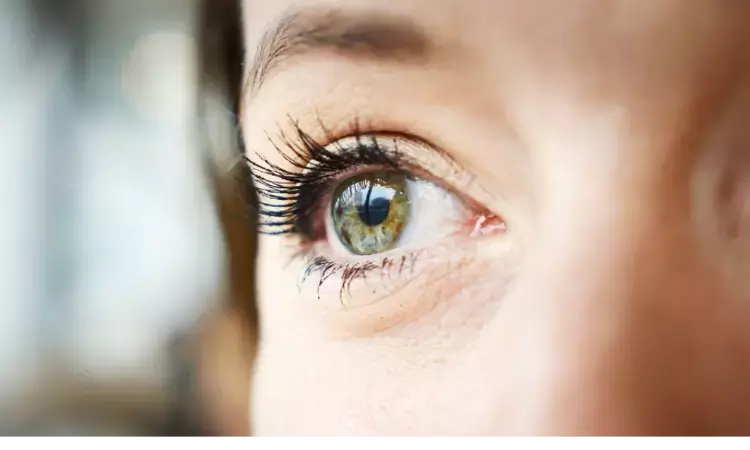- Home
- Medical news & Guidelines
- Anesthesiology
- Cardiology and CTVS
- Critical Care
- Dentistry
- Dermatology
- Diabetes and Endocrinology
- ENT
- Gastroenterology
- Medicine
- Nephrology
- Neurology
- Obstretics-Gynaecology
- Oncology
- Ophthalmology
- Orthopaedics
- Pediatrics-Neonatology
- Psychiatry
- Pulmonology
- Radiology
- Surgery
- Urology
- Laboratory Medicine
- Diet
- Nursing
- Paramedical
- Physiotherapy
- Health news
- Fact Check
- Bone Health Fact Check
- Brain Health Fact Check
- Cancer Related Fact Check
- Child Care Fact Check
- Dental and oral health fact check
- Diabetes and metabolic health fact check
- Diet and Nutrition Fact Check
- Eye and ENT Care Fact Check
- Fitness fact check
- Gut health fact check
- Heart health fact check
- Kidney health fact check
- Medical education fact check
- Men's health fact check
- Respiratory fact check
- Skin and hair care fact check
- Vaccine and Immunization fact check
- Women's health fact check
- AYUSH
- State News
- Andaman and Nicobar Islands
- Andhra Pradesh
- Arunachal Pradesh
- Assam
- Bihar
- Chandigarh
- Chattisgarh
- Dadra and Nagar Haveli
- Daman and Diu
- Delhi
- Goa
- Gujarat
- Haryana
- Himachal Pradesh
- Jammu & Kashmir
- Jharkhand
- Karnataka
- Kerala
- Ladakh
- Lakshadweep
- Madhya Pradesh
- Maharashtra
- Manipur
- Meghalaya
- Mizoram
- Nagaland
- Odisha
- Puducherry
- Punjab
- Rajasthan
- Sikkim
- Tamil Nadu
- Telangana
- Tripura
- Uttar Pradesh
- Uttrakhand
- West Bengal
- Medical Education
- Industry
In infants, strabismus development not affected by method of aphakia correction after cataract surgery

USA: Strabismus, in particular, exotropia, is common 10 years following infant monocular cataract surgery, regardless of aphakia management. Delayed exotropia emergence with longer follow-up suggests the need for caution in early esotropia management in these children. These are the findings from a recent study published in the Journal of American Association for Pediatric Ophthalmology and Strabismus.
The study was conducted by Erick D.Bothun, Departments of Ophthalmology, Mayo Clinic, Rochester Minnesota, and colleagues with the objective to characterize long-term strabismus outcomes in children in the Infant Aphakia Treatment Study (IATS).
The researchers performed secondary data analysis of long-term ocular alignment characteristics of children aged 10.5 years who were enrolled previously in a randomized clinical trial evaluating aphakic management after unilateral cataract surgery between 1 and 6 months of age.
The study led to the following findings:
- In the IATS study, 88% developed strabismus through the age of 10.5 years.
- Half of the 20 children who were orthophoric at distance through age 5 years maintained orthophoria at distance fixation at 10.5 years.
- Esotropia was the most common type of strabismus prior to age 5 years (51%), whereas exotropia (45%) was the most common type of strabismus at 10.5 years (esotropia, 21%; isolated hypertropia, 17%).
- Strabismus surgery had been performed on 52 children (48%), with 18 of these (35%) achieving microtropia <10Δ.
- Strabismus was equally prevalent in children randomized to contact lens care compared with those randomized to primary intraocular lens implantation (83% vs 82%).
- Median visual acuity in the study eye was 0.56 logMAR (20/72) for children with orthotropia or microtropia <10Δ versus 1.30 logMAR (20/400) for strabismus ≥10Δ.
The researchers wrote, "The delayed emergence of exotropia with longer follow-up indicates a need for caution in managing early esotropia in these children."
"Children with better visual acuity at 10 years of age are more likely to have better ocular alignment."
Reference:
Bothun ED, Shainberg MJ, Christiansen SP, Vanderveen DK, Neely DE, Kruger SJ, Cotsonis G, Lambert SR; Infant Aphakic Treatment Study. Long-term strabismus outcomes after unilateral infantile cataract surgery in the Infant Aphakia Treatment Study. J AAPOS. 2022 Jul 14:S1091-8531(22)00130-6. doi: 10.1016/j.jaapos.2022.05.003. Epub ahead of print. PMID: 35843488.
Dr Kamal Kant Kohli-MBBS, DTCD- a chest specialist with more than 30 years of practice and a flair for writing clinical articles, Dr Kamal Kant Kohli joined Medical Dialogues as a Chief Editor of Medical News. Besides writing articles, as an editor, he proofreads and verifies all the medical content published on Medical Dialogues including those coming from journals, studies,medical conferences,guidelines etc. Email: drkohli@medicaldialogues.in. Contact no. 011-43720751


